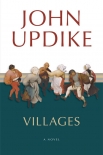Villages by John Updike (best summer reads of all time .TXT) 📗

- Author: John Updike
Book online «Villages by John Updike (best summer reads of all time .TXT) 📗». Author John Updike
“ ‘Cherce,’ ” Vanessa said. “That was part of the joke. Tracy said, ‘Cherce.’ ”
There was no lack of meat on Vanessa’s bones; she was wide-shouldered and thick-waisted like a man. He had, now and then, an unindulged impulse to twist her wrists, to beat her, knowing she could take it. Like him she had been of the poor and as in an unforgiving mirror showed him the abjectness of his needs. He was learning to resent the hold she had over him. It was possible, he discovered, to accept all the gifts one body can give another and yet dislike the inhabitant of that body. He felt inadequately tender toward Vanessa. For a year, and then another, he was her lover; no doubt not the only one. Her days were long, though she filled them with activities.
He was sorry he had said Trish had round heels. Whenever he came up to her at a party, he was afraid of knocking her over. His discourteous characterization coated the inside of his mouth with a phlegm that made it hard for him to talk to her as he must to win her trust—candidly, amusedly, with no more implication than she was ready for. “So,” he said to her at a fall party at Roscoe and Imogene Bisbee’s, “how do you like your new President?”
“He seems fine, though I’m not sure he should have pardoned Nixon.”
“Oh, we all need to be pardoned, don’t we?”
“Do we?” Patricia asked, looking away, as if something were happening beyond the Bisbees’ porch rail, down in the darkness where footsteps crunched on the spalled driveway, going back and forth to the cars.
“Maybe not you,” Owen said. “But seriously, if he hadn’t pardoned him the fuss and trial would have consumed all our energy.”
“You’re right,” she said; her agreement felt too quick, a way to get rid of him. He studied her from the side. Her profile showed a chafed pinkness to the nostrils and an underslung jaw that left her plump upper lip protruding as if pensively. He felt in her the crack of some old sorrow, like a teacup’s chipped rim on his tongue. Did he imagine, also, a certain impatience, an excess of wanting, expressed, as with Faye, by her clothes?
“I keep seeing you everywhere, jogging,” he said. “You look darling.”
“Oh, don’t,” Trish quickly cried, twisting there by the porch rail as if in the grip of an unshakable irritation.
She saw him, her reaction told him, as a dangerous man. “In your big sneakers and sweat pants,” he hastily explained. “I keep wondering if you’re ever afraid of getting hit.”
“I try to always wear something white. And the running shoes now have strips that light up in headlights.”
And her eyes, with lashes so spaced and starry they might be artificial, flared like headlights. He had alarmed her, been too pushy, too forward. “O.K., good,” he said quickly, backtracking. He had found in his experience that a woman’s basic desire to please will hold her to you even after an affront: the way Alissa had jumped back as if scalded, saying Oh no you don’t, and then come around wonderfully. He said, “Let’s talk about something else. How do you feel about that guy in California who had a sex-change operation wanting to compete in women’s tennis?”
“Well,” Trish cautiously admitted, “it’s unusual.”
She was not very bright, nor very beautiful. Why was he bothering her, making conversation, risking embarrassment, in the service of some strange dream of bringing this naïve woman to Vanessa like a live doe slung over his shoulders? They could each nibble at opposite ends and meet in the middle. The two women would adore him, vying for him, competing in feats of slavishness. “Speaking of unusual,” he pursued, “I was reading where they have a woman prison guard at a maximum security facility in Iowa.”
“And why not?” Trish asked, with a spark of pugnacity that brightened the dark of the Bisbees’ porch.
He backed off again. “I don’t know, and all these sex-change operations. It makes you wonder, what is a woman?”
“Yes,” she said. It was as if they were both under a table looking for a lost something—an earring, or a contact lens—and had found it. “Even when you are one,” she told him, “you wonder.”
The crack in the teacup must have to do with sex, sex and gangly foolish Dwight with his flapping kangaroo feet and ghastly effeminate guffaw. “Sometimes,” Owen ventured, “it must make you angry. Women are getting angrier. Look at Patty Hearst, going from Daddy’s girl to gun moll.”
“She was brainwashed,” Trish snapped, with one of her erratic quick bounces. “She was kidnapped and brainwashed and now she’s being hunted. And they say women have equal rights.” She was just enough younger than Owen to have feminism implanted in her; women Owen’s age had had to invent it for themselves, in a range of personal styles.
His appetite for this conquest was waning. He didn’t like politically prickly women; he liked them ironical and detached and devoted to the realm of the purely personal, the privilege of the free world. He asked her, “You know what I’ve really loved so far about this year?” He had in





Comments (0)